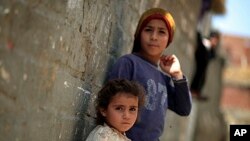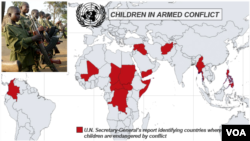UNITED NATIONS —
The United Nations says thousands of children have been killed, injured, tortured or recruited into militias and armies in the past year as a result of armed conflicts. In its annual report on the situation, the world body notes progress in some states, but a worsening situation in others, such as Mali, Syria and the Central African Republic.
The report chronicles violations in 21 countries during 2012 and includes Mali for the first time.
It focuses on six violations - recruitment and use of children in armed conflict, maiming and killing, abduction, sexual violence, denial of access for humanitarians, and attacks on schools and hospitals.
The Secretary-General’s Envoy for Children and Armed Conflict, Leila Zerrougui, said at the release of the report Wednesday the situation of children in Syria, Mali and the Central African Republic is especially troubling.
In Syria, where the conflict has entered its third year, the report cites the government for sexual violence against children and for targeting hospitals and schools. Zerrougui says the opposition Free Syrian Army recruits children into its ranks.
“They are killed, they are maimed, they are recruited, they are detained, they are tortured. So children are really - in Syria, outside of Syria - they are also bearing what is happening to the adults because they are IDPs, they are prevented from going to school, they are seeing their parents killed," said Zerrougui.
Zerrougui plans to return to the region this month to assess the situation, going to neighboring countries where thousands of Syrian children are living as refugees.
“What we would like to do is to see this stop. We would like to see parties take their responsibility to respect the standards that govern war and to ensure that children are not paying such a high price, and to preserve the life of civilians in general, and children in particular," she said. "We would like also to ask parties to allow humanitarians to access areas where children are in need."
In Mali, a rebellion in the north displaced thousands and led to grave violations against children, particularly by armed groups.
“Of course, in Mali, children are more than half of the population, and they were also severely affected by the conflict, they were killed, they were injured, but they were also recruited and a lot of sexual violence committed," said Zerrougui.
She said the situation in the Central African Republic was slowly improving until the end of 2012, when hostilities erupted between the government and the Séléka coalition and erased much of the progress made. She said the recruitment of children is widespread; there are numerous reports of gang rape; the bombing of churches and playgrounds; and attacks on schools and hospitals.
In many cases it is not just armed groups committing violations, but the very militaries that are supposed to be protecting civilians. This year’s report cites 46 armed groups and nine national militaries in its “List of Shame.”
There were two positive notes from the report: both Nepal and Sri Lanka were removed from the List of Shame this year and five governments signed action plans to end violations and prevent the recruitment and use of children as soldiers.
The report chronicles violations in 21 countries during 2012 and includes Mali for the first time.
It focuses on six violations - recruitment and use of children in armed conflict, maiming and killing, abduction, sexual violence, denial of access for humanitarians, and attacks on schools and hospitals.
The Secretary-General’s Envoy for Children and Armed Conflict, Leila Zerrougui, said at the release of the report Wednesday the situation of children in Syria, Mali and the Central African Republic is especially troubling.
In Syria, where the conflict has entered its third year, the report cites the government for sexual violence against children and for targeting hospitals and schools. Zerrougui says the opposition Free Syrian Army recruits children into its ranks.
“They are killed, they are maimed, they are recruited, they are detained, they are tortured. So children are really - in Syria, outside of Syria - they are also bearing what is happening to the adults because they are IDPs, they are prevented from going to school, they are seeing their parents killed," said Zerrougui.
Zerrougui plans to return to the region this month to assess the situation, going to neighboring countries where thousands of Syrian children are living as refugees.
“What we would like to do is to see this stop. We would like to see parties take their responsibility to respect the standards that govern war and to ensure that children are not paying such a high price, and to preserve the life of civilians in general, and children in particular," she said. "We would like also to ask parties to allow humanitarians to access areas where children are in need."
In Mali, a rebellion in the north displaced thousands and led to grave violations against children, particularly by armed groups.
“Of course, in Mali, children are more than half of the population, and they were also severely affected by the conflict, they were killed, they were injured, but they were also recruited and a lot of sexual violence committed," said Zerrougui.
She said the situation in the Central African Republic was slowly improving until the end of 2012, when hostilities erupted between the government and the Séléka coalition and erased much of the progress made. She said the recruitment of children is widespread; there are numerous reports of gang rape; the bombing of churches and playgrounds; and attacks on schools and hospitals.
In many cases it is not just armed groups committing violations, but the very militaries that are supposed to be protecting civilians. This year’s report cites 46 armed groups and nine national militaries in its “List of Shame.”
There were two positive notes from the report: both Nepal and Sri Lanka were removed from the List of Shame this year and five governments signed action plans to end violations and prevent the recruitment and use of children as soldiers.





